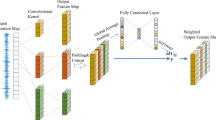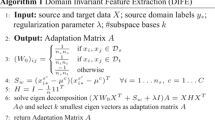Abstract
Unsupervised domain adaptation as one of the popular techniques of deep transfer learning used to tackle the model performance suffers the domain gap between the source and target data, and it is recently developed for bearing fault diagnosis under variable working conditions. Existing methods focus on learning the domain-invariant features but seldom considering whether the representations are transferable for domain adaptation. To address the mentioned problem, a novel adversarial-based two-branch transferable mapping shift network (TMSN) is proposed by introducing two-granularity feature fusion and transferable feature adaptive selection methods. Specifically, first, a two-branch ResNet34 baseline and a Transformer-based concatenation module are integrated to extract deep features of the raw vibration signals. Second, a multi-head attention-based transferable mapping shift (TMS) module is employed to adaptatively enhance the transferable features and weaken the non-transferable ones at different key layers of feature extractor. Furthermore, a domain adaptor is used to measure the feature discrepancies of different domains. Experiments are conducted on public dataset, the results present that TMSN obtains the best performance compare with other state-of-the-art approaches. The visualizations of distribution discrepancy and attention weights of TMS modules imply that TMSN can adaptively select the transferable features and effectively align the source and target domains. The proposed TMSN is effective for the bearing diagnosis tasks under variable conditions.








Similar content being viewed by others
Data availability
The data used in this paper are all from public dataset.
References
Zhao, W., Liu, J., Zhao, W., et al.: An investigation on vibration features of a gear-bearing system involved pitting faults considering effect of eccentricity and friction. Eng. Fail. Anal. 131, 105837 (2020)
Luo, S., Huang, X., Wang, Y., et al.: Transfer learning based on improved stacked autoencoder for bearing fault diagnosis. Knowl. Based Syst. 256, 109846 (2022)
Liu, Y., Shi, K., Li, Z., et al.: Transfer learning method for bearing fault diagnosis based on fully convolutional conditional Wasserstein adversarial networks. Measurement 180, 109553 (2021)
Li, X., Jiang, X., Wang, Q., et al.: Multi-perspective deep transfer learning model: a promising tool for bearing intelligent fault diagnosis under varying working conditions. Knowl. Based Syst. 243, 108443 (2023)
Ma, L., Jiang, B., Xiao, L., et al.: Digital twin-assisted enhanced meta-transfer learning for rolling bearing fault diagnosis. Mech. Syst. Signal Process. 200, 110490 (2023)
Liang, X., Gu, Z., Xie, Y., et al.: MUSEDA: multilingual unsupervised and supervised embedding for domain adaption. Knowl. Based Syst. 273, 110560 (2023)
Li, W., Huang, R., Li, J., et al.: A perspective survey on deep transfer learning for fault diagnosis in industrial scenarios: theories, applications and challenges. Mech. Syst. Sig. Process. 167, 108487 (2022)
Zhong, H., Yu, S., Trinh, H., et al.: Fine-tuning transfer learning based on DCGAN integrated with self-attention and spectral normalization for bearing fault diagnosis. Measurement 210, 112421 (2023)
Tang, T., Wu, J., Chen, M.: Lightweight model-based two-step fine-tuning for fault diagnosis with limited data. Meas. Sci. Technol. 33, 125112 (2022)
Zhu, Y., Zhuang, F., Wang, J., et al.: Deep subdomain adaptation network for image classification. IEEE Trans. Neural Netw. Learn. Syst. 32(04), 1713–1722 (2021)
Wang, J., Chen, Y., Feng, W.: Transfer learning with dynamic distribution adaptation. ACM Trans. Intell. Syst. Technol. 11(01), 1–25 (2020)
Huang, M., Yin, J., Yan, S., et al.: A fault diagnosis method of bearings based on deep transfer learning. Simul. Model. Pract. Theory 122, 102659 (2023)
Sugiyama, M., Suzuki, T., Nakajima, S., Kashima, H., et al.: Direct importance estimation for covariate shift adaptation. Ann. Inst. Stat. Math. 60(4), 699–746 (2008)
Sriperumbudur, B., Gretton, A., Fukumizu, K., Scholkopf, B., Lanckriet, G.: Hilbert space embeddings and metrics on probability measures. J. Mach. Learn. Res. 99, 1517–1561 (2010)
Long M., Cao Y., Wang J., Jordan M.: Learning transferable features with deep adaptation networks. In: 32nd International conference on machine learning (ICML), pp. 97–105, ICML (2015).
Arjovsky M., Chintala S., Bottou L.: Wasserstein generative adversarial networks. In: 34th International conference on machine learning (ICML), pp. 214–223 ICML, (2017).
Chen, J., Liu, H.: A multi-gradient hierarchical domain adaptation network for transfer diagnosis of bearing faults. Expert Syst. Appl. 225, 12 (2023)
Chen, L., Ma, Y., Hu, H., Khan, U.: An effective fault diagnosis approach for bearing using stacked de-noising auto-encoder with structure adaptive adjustment. Measurement 214, 112774 (2023)
Zhao, X., Yao, J., Deng, W., et al.: Normalized conditional variational auto-encoder with adaptive focal loss for imbalanced fault diagnosis of bearing-rotor system. Mech. Syst. Signal Process. 170, 108826 (2022)
Zhang, C., Zhao, Q., Wang, Y.: Transferable attention networks for adversarial domain adaptation. Inform. Sci. 539, 422–433 (2020)
Ganin, Y., Ustinova, E., Ajakan, H., Germain, P., et al.: Domain-adversarial training of neural networks. J. Mach. Learn. Res. 17, 2030–2096 (2016)
An, Y., Zhang, K., Chai, Y., et al.: Bearing fault diagnosis under variable working conditions base on contrastive domain adaptation method. IEEE Trans. Instrum. Meas. 71, 3522711 (2022)
Vaswani A., Shazeer N., Parmar N., Uszkoreit J., et al.: Attention is All You Need. In: 31st Conference and Workshop on Neural Information Processing Systems (NIPS), pp. 1–15, (2017).
Zhao, Z., Li, T., Wu, J., et al.: Deep learning algorithms for rotating machinery intelligent diagnosis: an open source benchmark study. ISA Trans. 107, 224–255 (2020)
Wang X., Li L., Ye W., et al.: Transferable attention for domain adaptation. In: The AAAI Conference of Artificial Intelligence, pp. 5018–5027, (2017).
Zhu, Y., Zhuang, F., Wang, J., et al.: Deep subdomain adaptation network for image classification. IEEE Trans. Neural. Netw. Learn. Syst. 32, 1713–1717 (2021)
Hasan, M., Kim, J.: Bearing fault diagnosis under variable rotational speeds using Stockwell transform-based vibration imaging and transfer learning. Appl. Sci. 8(12), 2357 (2018)
Lessmeier C., Kimotho J., Zimmer D., et al. Condition Monitoring of bearing damage in electromechanical drive systems by using motor current signals of electric motors: a benchmark data set for data-driven classification. In: PHM Society European Conference, (2016).
Hasan, M., Sohaib, M., Kim, J.: An explainable AI-based fault diagnosis model for bearings. Sensors 21(12), 4070 (2021)
Funding
This study was supported by Project of the National Natural Science Foundation of China (51765009), Technology Fund Project of Guizhou Provincial Science and Technology Department (QiankeheLHZi(2014)7452), and Liupanshui Science and Technology Bureau Fund Project (52020–2022-PT-02).
Author information
Authors and Affiliations
Contributions
SC contributed to method design, validation, writing—original draft and writing—review and editing. YL contributed to formal analysis, investigation and resources. CB contributed to methodology. LH provides revision and suggestions. All authors reviewed manuscript.
Corresponding author
Ethics declarations
Conflict of interest
The authors declare no competing interests.
Ethical approval
The research not involving human participants and/or animals.
Additional information
Publisher's Note
Springer Nature remains neutral with regard to jurisdictional claims in published maps and institutional affiliations.
Rights and permissions
Springer Nature or its licensor (e.g. a society or other partner) holds exclusive rights to this article under a publishing agreement with the author(s) or other rightsholder(s); author self-archiving of the accepted manuscript version of this article is solely governed by the terms of such publishing agreement and applicable law.
About this article
Cite this article
Che, S., He, L., Liu, Y. et al. Transferable mapping shift network for unsupervised domain adaptation using in vibration signal fault diagnosis under variable conditions. SIViP 18 (Suppl 1), 199–209 (2024). https://doi.org/10.1007/s11760-024-03143-y
Received:
Revised:
Accepted:
Published:
Issue Date:
DOI: https://doi.org/10.1007/s11760-024-03143-y




